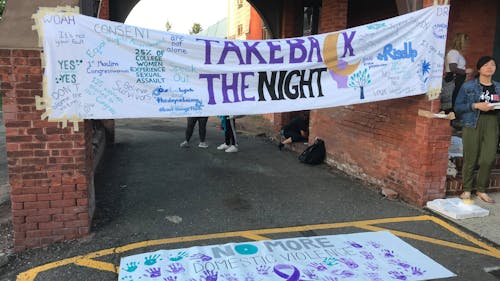'Take Back the Night' march demonstrates solidarity for survivors of sexual assault

More than one hundred students bearing signs and posters marched down George Street on Wednesday evening, starting from Douglass campus and ending at the College Avenue campus to “Take Back the Night,” an event organized by Women Organizing Against Harassment (WOAH) and Violence Prevention and Victim Assistance (VPVA).
Talia Lang, a School of Arts and Sciences junior and president of WOAH, said the event had two purposes. The first was to show solidarity with survivors at Rutgers, which meant both hearing them and believing what they said. The second purpose was to raise awareness on the issue of sexual assault.
“No one should be afraid to walk alone at night just because of their sex, sexuality, gender, ethnicity, race, religion or for any other reason,” Lang said.
Students first started at a rally in Carpenter Hall at 7 p.m., where they made posters supporting survivors and had an open mic.
At approximately 8 p.m., participants then marched more than 2 miles down George Street, which Rutgers University Police Department (RUPD) shut down to accommodate the march.
The event ended at Records Hall, located on the College Avenue campus, where students were able to speak out about their experiences or feelings about the themes of Take Back the Night. During the speak-out, there were some students who recited poetry. Some students spoke about their personal experiences with sexual assault, a few holding back tears as they admitted to the audience that their story was one they had never been able to speak openly about.
Others recounted stories of their friends or family members being sexually assaulted, some of these victims as young as 8 years old.
The intersectionality of sexual assault was also addressed, with some speakers touching on how their race, sexual orientation or sexual identity shaped their fears and experiences with sexual assault. In the end, more than a dozen students spoke out, with each of them receiving support and cheers from the crowd.
The movement started more than four decades ago, in the 1970s during the period of second-wave feminism, which aimed to increase equality for women through more than just enfranchisement. It was a call for people to “take back the night” from rape culture, victim-blaming and fear of walking alone after dark, thus giving the event its name.
Even after 50 years, though, Lang said the reasons for the march’s creation are still prevalent today.
“Until these reasons go away, we'll continue organizing the march,” she said.
The event takes an entire year to plan, starting in the spring when WOAH has to submit applications to the RUPD and the City of New Brunswick to have George Street shut down. Every year, approximately 200 to 600 people are expected to attend the march. Lang said the numbers fluctuate depending on the scope of politics and activism that year.
Though the march was an important demonstration of awareness and solidarity, Lang also said it was important for participants to continue the conversation by contacting representatives, encouraging people to vote and educating those around them.
“Marching is just the glamorous front to all the hard work that goes into making actual change, so we want to encourage people to go to work, and then to come back next year for Take Back the Night 2020 and tell us all about it,” she said.



